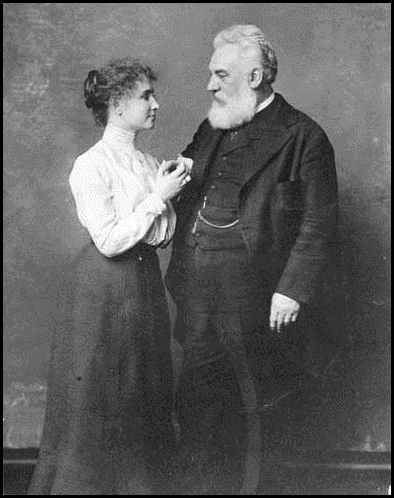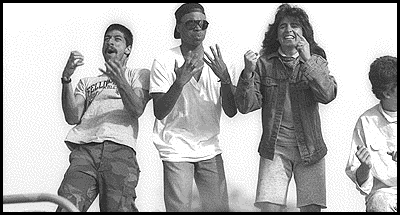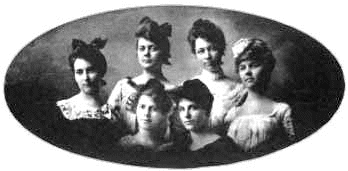American
Poetry
An Anthology
John Lee Clark, Editor
(Gallaudet University)

- Heard melodies are sweet, but those unheard
Are sweeter; therefore, ye soft pipes, play on;
Not to the sensual ear, but, more endear'd,
Pipe to the spirit ditties of no tone ...
Then there is "oralism" vs. "manualism." The first uses lip reading, speech, mouth movements and hearing technology to communicate. Vide Alexander Graham Bell who invented the telephone to assist his deaf mother and his deaf wife, Mabel Hubbard. [See Bell in Fig 1, above, with Helen Keller.]
According to the deaf, oralism takes a great deal of work, is immensely tiring. On the other hand, manualism uses handshapes, movement and facial expression, and is far simpler than oralism, and was favored by Thomas Hopkins Gallaudet and his son, Edward Miner Gallaudet. Manualism was popular before the 1860s, was said to bring the deaf "closer to god." It was considered an art, like French mime and pantomime.
Among the deaf, and their hearing instructors, the debate between oralism and manualism was bitter, and, apparently, seems to be ongoing. There are poems in Deaf American Poetry that mourn the hundred years when the latter was in eclipse. In "The Oralist," James William Sowell writes,
- Oralist, O oralist, show your silken hose
Little souls are sacrificed that you may wear such clothes...
The poem ends,
- Oralist, O oralist, turn your head aside,
Know you not the pitying Christ for sins like yours has died?
Evidently the world of the deaf is rife with such controversy. In one poem, Loy E. Golladay (who the editor refers to as "a poet of the Deaf Pride movement") elaborates on S. E. E. (Signing Exact English) and offers a very funny poem about "Anthropological Linguistics." A chimpanzee "at interpreting he could not be beat; / He signed with equal skill --- both hands and feet..."
- It was a marvel of bilingual grace. He added footnotes at the proper place.
 We have in this volume almost a hundred poems and two hundred years of deaf poetry. Some of them, from the early 19th Century, are, according to the editor, examples of "pandering to a hearing audience." The very first poem by John R. Burnet tells of "the desolating chill ... the dungeon darker, --- colder still; / Such was the lot the deaf and dumb have borne."
We have in this volume almost a hundred poems and two hundred years of deaf poetry. Some of them, from the early 19th Century, are, according to the editor, examples of "pandering to a hearing audience." The very first poem by John R. Burnet tells of "the desolating chill ... the dungeon darker, --- colder still; / Such was the lot the deaf and dumb have borne."
Most poems in the first 150 pages or so don't fare much better. The famous college founded in 1857 as the "Columbia Institution for the Instruction of the Deaf and Dumb and the Blind" (the name was changed to Gallaudet College in 1954) is the publisher of this volume. Deaf American Poetry includes a poem by George M. Teegarden, commemorating the school:
- Hail Gallaudet! Thy sons and daughters throng
Into thy halls with laughter and song;
In grateful homage, true, they praises bring,
And to thee, Gallaudet, in gestures sing.
My gut feeling about this volume is that it can be divided into three parts. The first is the oh-how-miserable-it-all-is school, represented by Burnet and others. Then, starting in the mid-20th Century, comes the it's-not-what-you-think bunch, characterized by Robert F. Panara. His "On His Deafness" --- there's a touch of Milton in the title --- is said to be "the most widely anthologized and quoted poem by a Deaf writer."
- My ears are deaf, and yet I seem to hear
Sweet nature's music and the songs of man
For I have learned from Fancy's artisan
How written words can thrill the inner ear...
The poem ends with the writer not hearing but sensing
- The lover's sigh, the thrumming of guitar,
And, if I choose, the rustle of a star!
For this critic, the volume comes to noisy and raucous life with Kristi Merriweather's "Be Tellin' Me,"
- People tell me
what they think
a black deaf female is...
I say
excuse my standard English, but
_____ you
I don't take no
second-handed,
mulatto
prescribed
whittled-down
semi-that,
half-here,
part this
culture...
And, best of all, Debbie Rennie's "As Sarah," complete with no blanks,
- I played her
because she drew a hearing aid on
a picture of Virgin Mary
Her mother cried and
threw her out to deaf school
she thought that her own daughter is
mental retarded.
I understand her very well
She filled up with rage inside her
Again, mother wants her to be normal by
fucking with hearing boys.
